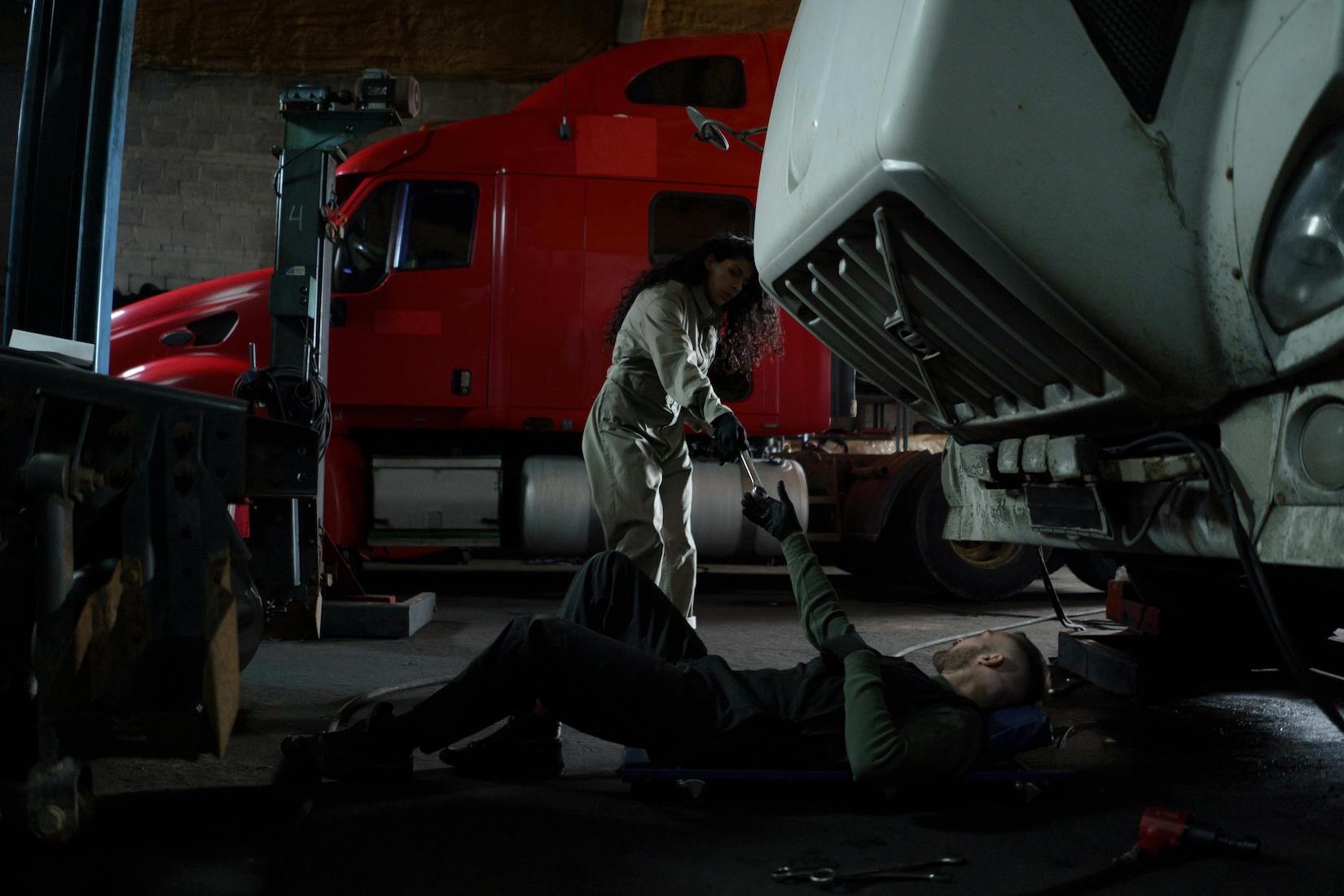When a semi truck driver breaks down on the open road in an 80,000 lb rig, it’s nerve-wracking and potentially dangerous, both for the driver and everyone else on the road. The driver must safely pull over and quickly contact a qualified mobile technician who can come to their location and make the necessary repairs. Last-minute emergency commercial truck repair is a specialized service; finding someone reliable when stranded far from a shop isn’t always easy.
This blog covers semi truck repairs — the most common issues drivers face and how to prevent them. But first, let’s quickly answer a fundamental question: What exactly is a semi truck?
What Do We Mean by Semi Truck, 18-Wheeler, and Tractor-Trailer?
The terms semi-truck, 18-wheeler, and tractor-trailer are often used interchangeably. However, semi-truck refers specifically to the front half of the engine-powered cab, while an 18-wheeler and a tractor-trailer refer to the entire unit, including the cab and the trailer. So, the semi-truck is where the mechanics are housed and, as such, where all the mechanical repairs and maintenance are done.
Common Semi Truck Repairs Drivers Face
With so many moving parts and specialized maintenance needs, a lot can go wrong with a semi truck. That’s why drivers need to have a basic understanding of the common repairs they might face out on the open road, including:
- Brake system failures: The most common and dangerous are brake system failures, including air leaks, worn brake pads, or overheating.
- Engine overheating: When your engine light goes on, you know there’s something wrong with your truck. Engine problems can also include overheating and loss of power.
- Electrical issues: Electrical issues can affect the starter, alternator, or battery and are difficult to trace and identify.
- Transmission problems: Transmission problems can be scary, especially if shifting becomes difficult, gears start slipping, or fluid starts to leak.
- Suspension failures: Suspension failures can include blown shocks or loose steering components, which can be especially dangerous when driving a big rig.
- Tire blowouts and wear: Tire blowouts are the worst-case scenario when a driver is barreling down the highway. They are caused by tread wear, road debris, or underinflated tires.
- Trailer and lighting malfunctions: This includes brake lights, turn signals, and faulty wiring.
Causes of Semi-Truck Breakdowns
Many of the causes of semi-truck breakdowns are preventable through maintenance. Below is a list of causes of breakdowns you want to avoid:
- Lack of routine maintenance: By far the biggest reason for semi-truck breakdowns is lack of routine maintenance.
- Harsh weather exposure: Heat, cold, rain, and ice can accelerate wear on brakes, tires, and electrical systems.
- Overloaded freight: Too much weight can be placed on tires and brakes. The additional weight can also tax the engine, often causing overheating.
- Skipping safety inspections: Safety is the first order of business when driving a semi-truck on the open road. Skipping safe inspections is both dangerous and potentially costly.
How to Prevent Costly Semi Truck Repairs
Preventing costly semi-truck repairs is relatively straightforward, but it can sometimes be difficult to schedule on a busy fleet schedule. Build in time for maintenance and repairs, before it becomes an emergency repair situation. The following are a few things to prevent semi-truck repairs.
- Schedule routine commercial semi-truck repair inspections: Regular inspections are the cornerstone of your maintenance program and shouldn’t be skipped.
- Replace worn tires early: Worn tires are a safety issue for your driver and other motorists. A semi-truck with worn tire threads should never be sent out on the road.
- Monitor coolant and oil levels: Checking fluids is a straightforward preventative measure.
- Check brakes regularly: Brake checks go hand in hand with tire inspections — both are critical for safety. Make sure your brakes are in top condition to avoid dangerous situations, especially if the driver needs to stop suddenly.
- Inspect electrical systems monthly: Monthly electrical checks are essential, since electrical problems are notoriously difficult to trace. It can become a time-consuming and expensive fix if a mobile technician has to troubleshoot them during a breakdown.
When to Call for Help Out on the Road
Knowing when and where to call for help on the road is crucial. You should prioritize the safety of the vehicle, other motorists, and yourself. Here are a few tips on what to do if you break down and when to call for help.
- Breakdowns en route: These are breakdowns that happen en route to your destination. Drivers are often on a tight schedule and feel the pressure to keep moving. If something starts to go wrong, pull over immediately, don’t push your vehicle beyond what it can handle.
- Unfamiliar warning lights: Warning lights like ‘check engine’ and the ‘brake system warning light’ can’t be ignored. Pull over immediately, reach a safe place, and call for help.
- Visible fluid leaks: It might be tempting to keep driving when you see a fluid leak, especially if you’re close to your destination. But this is another example of when it’s time to pull over.
- Repeated stalling or engine misfires: Stalling, sputtering, and misfires can indicate a serious problem.
Breakdowns That Happen Off the Road
Not all breakdowns happen on the open highway. Some repair issues occur when the truck is not in use and idle, maybe parked at a depot or loading dock, or during a pre-trip inspection. These breakdowns may not feel urgent, but they’re just as critical to address quickly to avoid bigger problems once the truck hits the road again.
Choosing the Right Commercial Semi Truck Repair Shop
Not all repair shops are created equal in terms of experience and knowledge. Dependability is everything if you manage tight delivery schedules or oversee an entire fleet. You might be an independent driver or part of a logistics team. If so, finding a trusted partner for commercial semi truck repair is key to minimizing downtime and keeping operations on track.
That’s where Fleet Advisor comes in. We provide emergency mobile fleet repair, fleet management and maintenance, and DOT inspections in Denver, Dallas, and the surrounding areas. Our expert teams take the stress of maintenance and compliance off your shoulders, so you can focus on growing your fleet without being slowed down by unexpected repairs or routine service issues. With certified mobile technicians, emergency response capabilities, and proven heavy-duty truck and trailer repair expertise, we can handle whatever the road throws at you.
Contact Fleet Advisor to connect with a repair team that understands urgency and keeps your fleet moving.
Go to shop for all your fleet maintenance needs in Denver and the surrounding areas. Our years of experience have led us into this venture, a one-stop shop for all your fleet’s needs.


